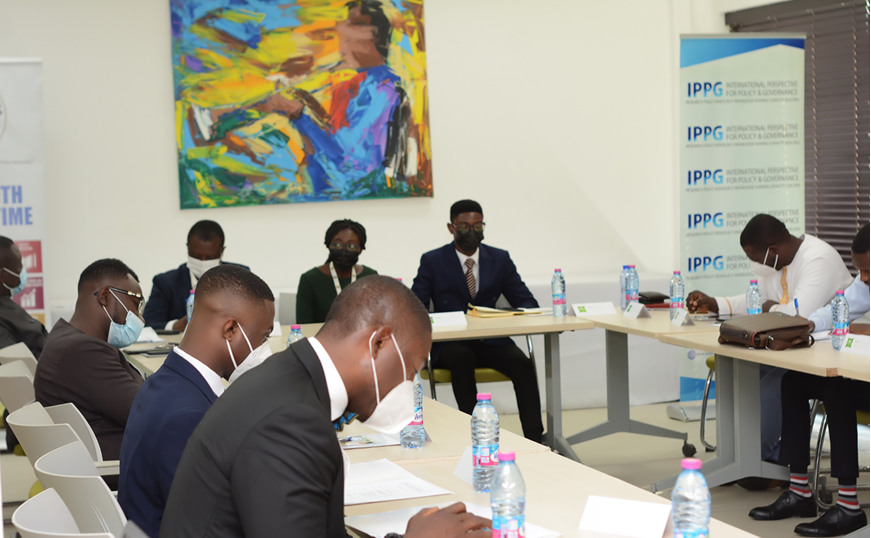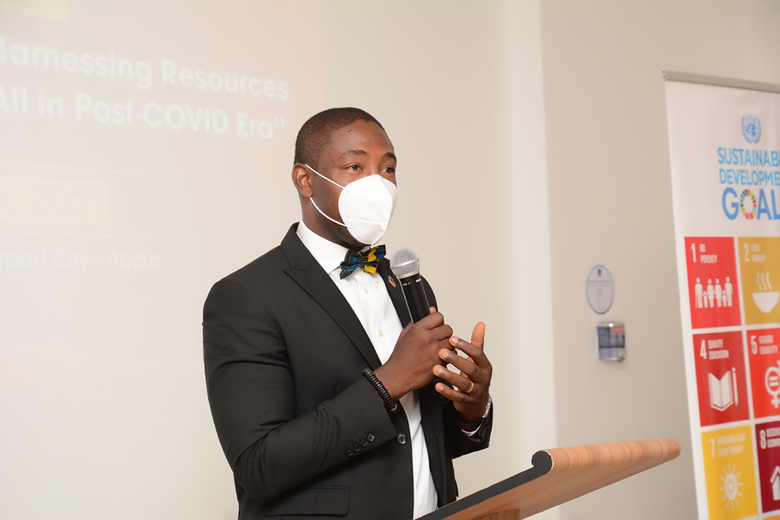Building Back Better: Assessing Ghana’s Response to COVID-19 Pandemic
The International Perspective for Policy & Governance (IPPG) has facilitated a round table meeting convened by the Young Diplomats of Ghana (YDG), IPPG’s youth diplomacy and advocacy wing to assess Ghana’s response to the COVID-19 pandemic and deliberate on policy strategies to build a resilient health system that can accelerate universal health access for all Ghanaians.

A cross section of participants at the round table meeting
The meeting which was held on November 11 at the Ibis Styles Hotel in Accra on the theme “Building Back Better: Harnessing Resources to Achieve Health for All in the Post COVID-19 Era” brought together government officials and policymakers, public health experts, economists, diplomats, international relations practitioners, young people, and other stakeholders to deliberate on the subject matter.
Ghana’s COVID-19 Response Strategy
The meeting brought to fore that Ghana adopted a five-prong strategy to address the COVID-19 pandemic. The strategy included limiting the importation of the coronavirus, controlling community spread, providing adequate care for the sick, mitigating the socio-economic impact on citizens, and building capacity to reduce dependence on foreign countries and donors. According to the experts gathered for the meeting, this strategy was very encouraging, having yielded positive results that curbed the fast spread of the virus across the country.
A key component of the performance of Ghana’s strategy was identified as the political will to tackle the pandemic. This included the high-risk mitigation measures adopted by government based on advice and recommendations from scientists and experts of which the National Development Planning Commission (NDPC) was instrumental. The inter-ministerial and multisectoral approach adopted by government to implement the strategy was also identified as an innovative conduit through which COVID-19 was streamlined, monitored, and managed across the multiple sectors of the economy.
To strengthen the multisectoral approach, the COVID-19 Recovery Plan was developed by the NDPC to ensure that government’s recovery strategies are implemented across all levels of the governance chain. Metropolitan, Municipal and District Assemblies (MMDAs) led the implementation of the strategy at the subnational level including districts and the local communities. The NDPC is currently in the process of formalizing an Emergency Response Strategy to consolidate the gains achieved through the recovery plan and to ensure continuity and sustainability of the recovery process.

Dr. Bernard Okoe Boye, former Deputy Health Minister delivering his opening remarks at the meeting
Some Ministerial Responses
The Ministry of Gender, Children, and Social Protection established an emergency call center to build trust on information sharing and to rapidly disperse information about the pandemic. The call center was also opened for citizens to call for covid-19 related help and assistance. Out of the 1,622 calls received during the peak of the pandemic, 1,152 were directly related to COVID-19. The rest were calls due to abuse of the opportunity by citizens. The Ministry was also engaged in a cross-country social intervention drive including the provision of food and shelter for vulnerable people impacted by the pandemic.
The Ministry of Finance oversaw government’s economic stimulus measures created through the Coronavirus Alleviation Programme (CAP). Key initiatives under the CAP included a GH¢579.5 million allocation for the COVID-19 Emergency Preparedness and Response Plan (EPRP); GH¢200 million relief for the provision of water and sanitation for households for three months; GH¢1,028 million as three-month subsidy for electricity use in households and businesses; GH¢54 million for the distribution of hot meals and food packages, and GH¢ 323 million as relief (e.g. PPEs, tax waiver, allowances, transportation and COVID insurance) for frontline health workers. Interventions under the CAP also provided financial clearance for the employment of 24,285 health professionals between March and June 2020 to help fight the pandemic.
The Ministry of Trade and Industry through the National Board for Small Scale Industries (NBSSI) was responsible for the rolling out a GH¢600.0 million CAP Business Support Scheme (CAP-BuS). Through the scheme, government in collaboration with businesses, trade associations, and selected commercial and rural banks rolled out a soft loan scheme with a one-year moratorium and two-year repayment period for micro, small and medium-sized enterprises (MSMEs) impacted by the pandemic.
The Ministry of Health was at the forefront of the formulation and implementation of Ghana’s policy strategies in response to the pandemic, having declared COVID-19 a public health emergency pursuant to Section 169 of Ghana’s Public Health Act, 2012, (Act 852). The ministry continuously heightened surveillance at all points of entry to ensure that Ghanaians are safe and secured. The ministry also served as a point of call for data and statistics on COVID-19 cases recorded in Ghana while coordinating COVID awareness and education campaigns across the country and enforcing the implementation of its directives on the use of face masks in all public places with other state agencies.
Building Back Better.
To build back better, government is committed to raising a GH¢100 billion fund to support the implementation of the Ghana COVID-19 Alleviation and Revitalization of Enterprises Support (Ghana CARES) Obaatanpa Programme. The Obatanpa program is an ambitious economic recovery program designed to enable the country to turn the challenges created by COVID-19 into opportunities for socio-economic transformation. The government is also on course to secure enough COVID-19 vaccines to vaccinate all Ghanaians. About 9 million COVID-19 vaccines are currently in storage ready for deployment and administration.
Universal Access to Healthcare
On universal healthcare, participants at the meeting unanimously agreed that Ghana has in place several policies that can drive the country towards the path of sustainable access to universal healthcare by 2030 as envisaged by Sustainable Development Goal 3 (Good Health and Well Being). These policies must however be crystalized to overcome the implementation blocks likely to hinder the successful roll out and outcomes of the policy targets.
IPPG Policy Report
To what extent did the Government of Ghana’s intervention yield the desired results in its COVID-19 response. What are the gaps in Ghana’s COVID 19 interventions? How did the citizens respond to these interventions? How can government position Ghana’s healthcare system to be resilient against new waves of COVID-19 or future global or domestic pandemics? How does Ghana harness existing policies to achieve good health and well-being for all, at every stage of life through universal access to healthcare?
A new IPPG policy report to be released based on this roundtable gathering of experts will provide answers to these questions.
For more information:
Dr. Nicholas Addae Mensah
0302-917430/ 0541-385477
info@ippgafrica.org

 Previous Post
Previous Post Next Post
Next Post